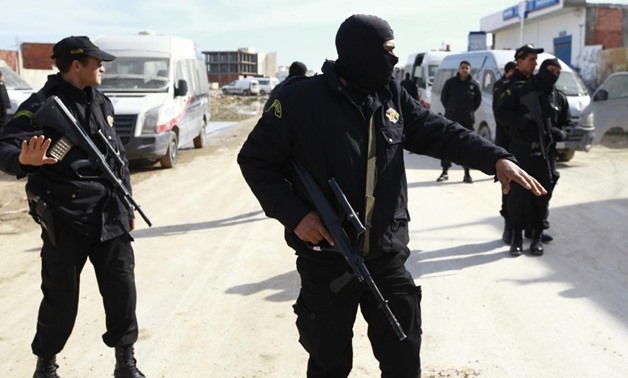
Tunisian police stand guard near a house in Raoued, a northern suburb of the capital Tunis, February 4, 2014. REUTERS/Anis Mili
TUNIS - 8 January 2018: Tunisian police on Monday fired tear gas and clashed with hundreds of people protesting against unemployment, high prices and new taxes in two towns, residents said.
Tunisia, widely seen in the West as the only democratic success among nations where "Arab Spring" revolts took place in 2011, is suffering increasing economic hardship. The dinar hit a record low on Monday on trade deficit data and other factors.
The North African country raised from Jan 1 the price of gasoil and some goods as well taxes on cars, phone calls, the internet, hotel accommodation and other items, part of austerity measures agreed with its foreign lenders.
The economy has been in crisis since a 2011 uprising unseated the old regime and two major militant attacks in 2015 hit the tourism sector, which comprises 8 percent of GDP and is a key source of foreign revenues.
Police fired tear gas in the central city of Thala to disperse hundreds demanding more development and jobs while protesting against high inflation.
The protesters burned wheels and threw stones at the police, Mohamed Hedi Omria, a resident, told Reuters. Clashes were also reported from Kasserine, another impoverished central town where hundreds protested against price increases.
In the capital Tunis security forces dispersed small protests late on Sunday against rising prices and taxes.
On Monday, about 300 people took to the streets in the central Tunisian town of Sidi Bouzid, cradle of the country's Arab Spring revolution, carrying banners aloft with slogans denouncing high prices.
TOURISM
A lack of tourists and new foreign investors scared of turmoil pushed the trade deficit up by 23.5 percent year-on-year in the first 11 months of 2017 to a record high $5.8 billion, official data showed at the end of December.
Concerns about the rising deficit have hurt the dinar, sending it to 3.011 versus the euro on Monday, breaking the psychologically important three dinar mark for the first time, traders said.
The currency is likely to weaken further, said local financial risk expert Mourad Hattab.
"The sharp decline of the dinar threatens to deepen the trade deficit and make debt service payments tighter, which will increase Tunisia's financial difficulties," he said.
Hattab said the dinar may fall to 3.3 versus the euro in the coming months due to high demand for foreign currency and little expectation of intervention from the authorities.
Last year, former Finance Minister Lamia Zribi said the central bank would reduce its interventions so that the dinar steadily declined in value, but it would prevent any dramatic slide.
The central bank has denied any plans to liberalise the currency but Hattab said Monday's decline showed there was an "undeclared float" of the dinar.
A weaker currency could further drive up the cost of imported food after the annual inflation rate rose to 6.4 percent in December, its highest rate since July 2014, from 6.3 percent in November, data showed on Monday.
Tunisia is under pressure from the International Monetary Fund to speed up policy changes and help its economy recover from militant attacks.
The 2018 budget raises taxes on cars, alcohol, phone calls, the internet, hotel accommodation and other items. It also raises customs taxes on some products imported from abroad, such as cosmetics, and some agricultural products.


Comments
Leave a Comment